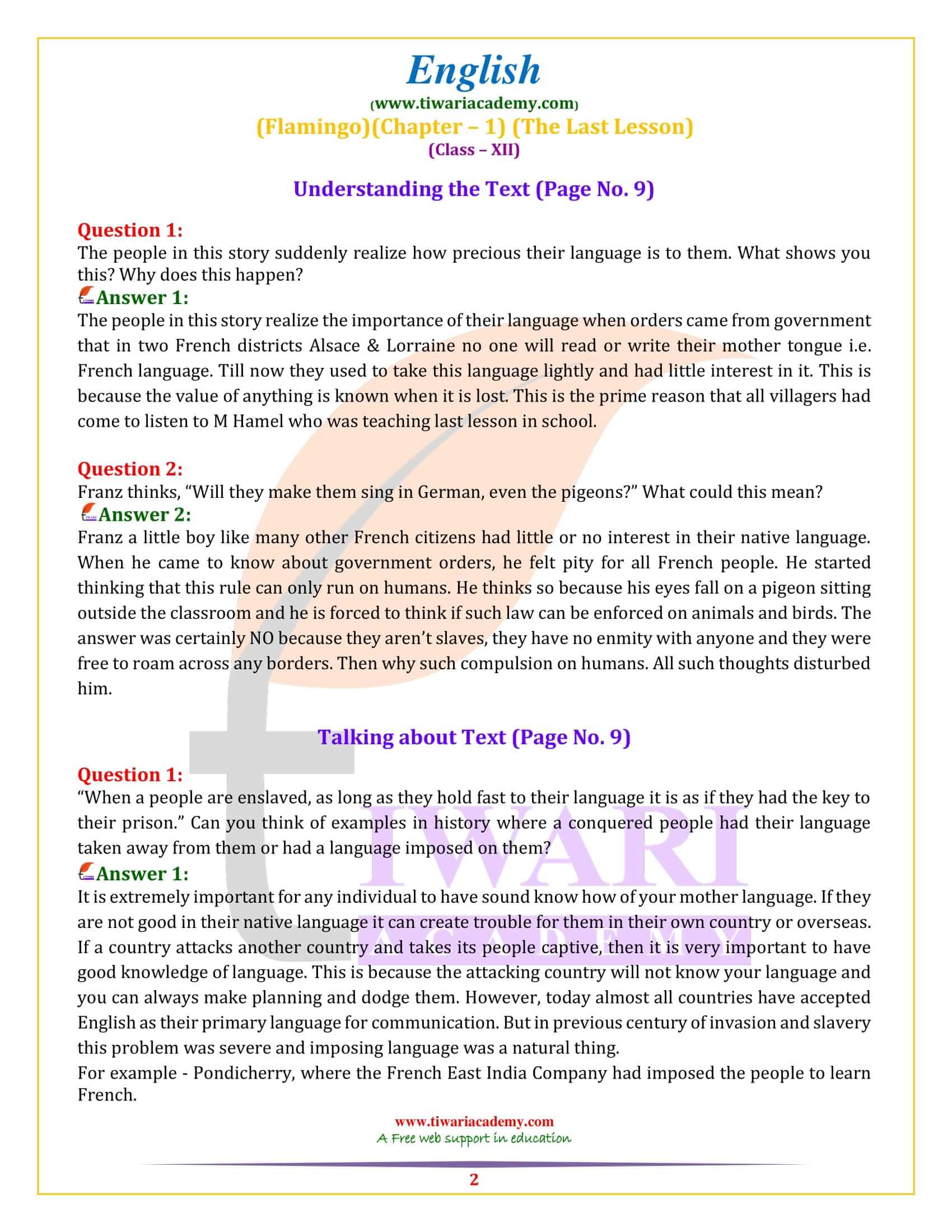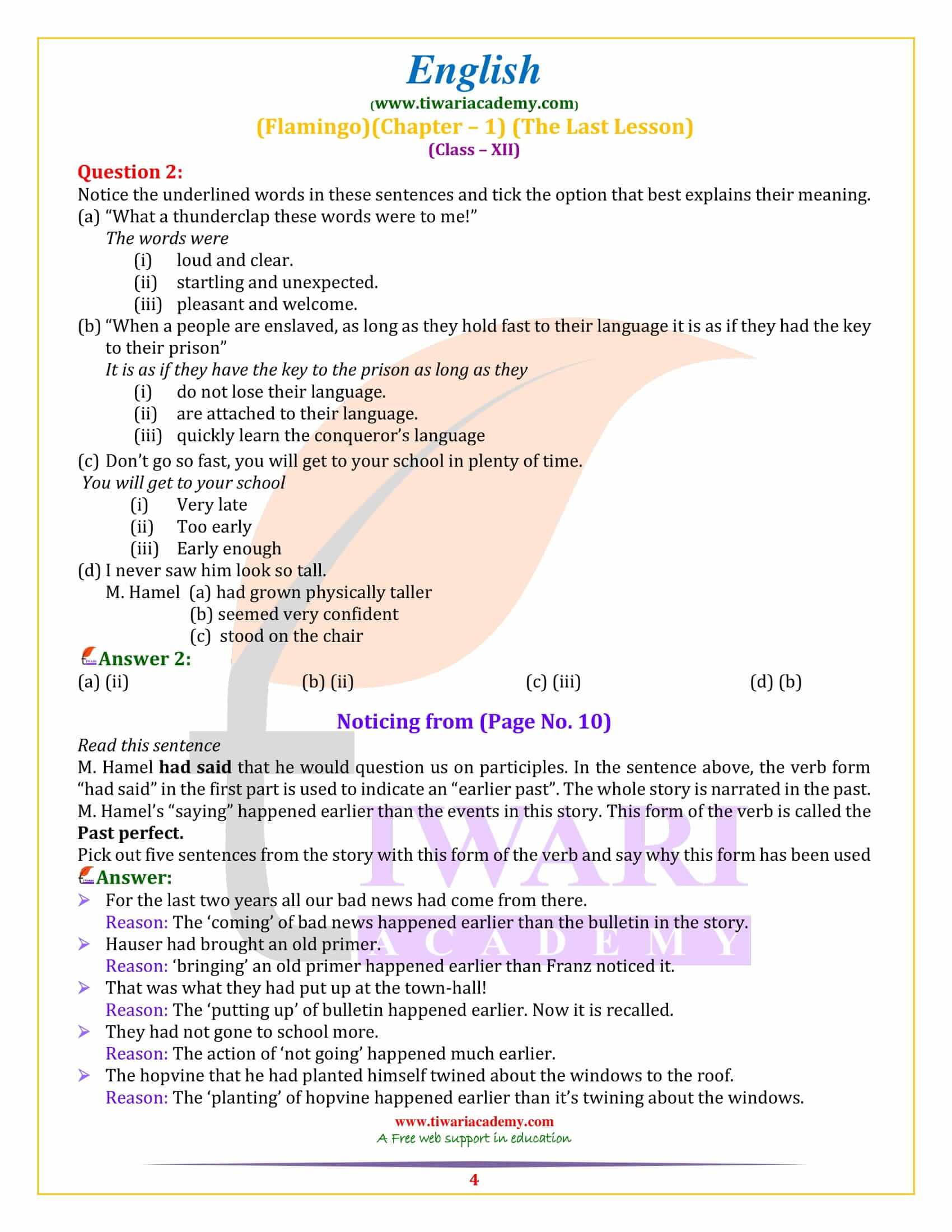NCERT Solutions for Class 12 English Chapter 1 the Last Lesson Flamingo updated and revised for new academic session 2024-25. Get here class 12 English chapter 1 exercise question answers, very short answer type, short answer type and long answer type extra questions with answers.
NCERT Solutions for Class 12 English Flamingo Chapter 1
Question Answers of Class 12 English Flamingo Chapter 1
12th English Flamingo Chapter 1 (Think as you read – Page No. 7)
What was Franz expected to be prepared with for school that day?
Franz was expected to be prepared with participles in French language. His teacher M Hamel had said that he would question the class on participles. And like any other day Franz was going to school without preparation as he had least interest in French language.
What did Franz notice that was unusual about the school that day?
Franz noticed two things pretty unusual that day. First, there were people standing in front of bulletin board and this was not normal. All bad news was known through this board only. Secondly, it was very peaceful at school that day. There was neither noise of children from the class nor the sound of teacher’s stick.
What had been put up on the bulletin-board?
Till now only bad news was coming from this board. An order had come from Berlin to teach only German in the schools of Alsace and Lorraine. The Germans had put up this notice on the bulletin-board. This was the reason for everyone’s disappointment that day.
What changes did the order from Berlin cause in school that day?
Answer 1:
The students were quiet that day in school. There was no noise of any kind in entire school. In the back seats of the class, all the villagers were sitting quietly like small children. This Berlin order united every resident of Alsace & Lorraine. Their faces were as if they were paying tribute to native language and also to M Hamel, a person who served his school and nation for 40 years.
How did Franz’s feelings about M. Hamel and school change?
Answer 2:
Franz was an average student and has less interest in studies. Even he was poor in his native language French. He was about to bunk the last lesson of his class because his teacher M Hamel was about to ask questions about participles on that day. When he came to know about orders of Berlin and this is his last lesson of French, his mind changed completely. He got sympathetic towards M Hamel and also for his own language. He felt sad that he had not paid attention till today. Those books which always seemed like enemies to him today seemed like old friends from whom he is going to be separated. He was disappointed like all his countrymen.
12th English Flamingo Chapter 1 (Talking about Text – Page No. 9)
When a people are enslaved, as long as they hold fast to their language it is as if they had the key to their prison. Can you think of examples in history where a conquered people had their language taken away from them or had a language imposed on them?
It is extremely important for any individual to have sound know how of your mother language. If they are not good in their native language it can create trouble for them in their own country or overseas. If a country attacks another country and takes its people captive, then it is very important to have good knowledge of language. This is because the attacking country will not know your language and you can always make planning and dodge them. However, today almost all countries have accepted English as their primary language for communication. But in previous century of invasion and slavery this problem was severe and imposing language was a natural thing.
For example – Pondicherry, where the French East India Company had imposed the people to learn French.
What happens to a linguistic minority in a state? How do you think they can keep their language alive? For example: Punjabis in Bangalore, Tamilians in Mumbai, Kannadigas in Delhi, Gujaratis in Kolkata.
Minorities in any state obviously feel a bit isolated. They feel very good when they get someone from their state. They talk on various issues from politics to religion or from food to clothes in own language. They make their own world in a foreign state. But India is a country of Unity in diversity. It’s a country of All in One and One in All. Here minorities are not discriminated on the basis of physical, culture, gender, social, religious, political, ideologies.
They can keep their language alive by celebrating regional festivals like harvest festival (Onam) of Kerala in August/September in other parts of the country as well. Elders should tell their next generation about their rituals, language, culture and tradition.
Is it possible to carry pride in one’s language too far? Do you know what linguistic chauvinism means?
Yes it is possible to carry pride in one’s language too far. We should not only feel good for our own language but for others as well.One should not disrespect other’s language to give importance to one’s own language. We must respect all languages and culture as it binds us together. India being a nation with 121 languages and 19,500 dialects we should teach our next generation to respect each other’s language.
The people in this story suddenly realize how precious their language is to them. What shows you this? Why does this happen?
Answer 1:
The people in this story realize the importance of their language when orders came from government that in two French districts Alsace & Lorraine no one will read or write their mother tongue i.e. French language. Till now they used to take this language lightly and had little interest in it. This is because the value of anything is known when it is lost. This is the prime reason that all villagers had come to listen to M Hamel who was teaching last lesson in school.
Franz thinks, “Will they make them sing in German, even the pigeons?” What could this mean?
Answer 2:
Franz a little boy like many other French citizens had little or no interest in their native language. When he came to know about government orders, he felt pity for all French people.He started thinking that this rule can only run on humans. He thinks so because his eyes fall on a pigeon sitting outside the classroom and he is forced to think if such law can be enforced on animals and birds. The answer was certainly NO because they aren’t slaves, they have no enmity with anyone and they were free to roam across any borders. Then why such compulsion on humans. All such thoughts disturbed him.
Notice the underlined words in these sentences and tick the option that best explains their meaning
What a thunderclap these words were to me! The words were
When a people are enslaved, as long as they hold fast to their language it is as if they had the key to their prison. It is as if they have the key to the prison as long as they
Don’t go so fast, you will get to your school in plenty of time. You will get to your school
I never saw him look so tall. M. Hamel
Noticing from (Page No. 10)
Read this sentence
M. Hamel had said that he would question us on participles. In the sentence above, the verb form “had said” in the first part is used to indicate an “earlier past”. The whole story is narrated in the past. M. Hamel’s “saying” happened earlier than the events in this story. This form of the verb is called the Past perfect.
Pick out five sentences from the story with this form of the verb and say why this form has been used
Answer:
- For the last two years all our bad news had come from there.
Reason: The ‘coming’ of bad news happened earlier than the bulletin in the story. - Hauser had brought an old primer.
Reason: ‘bringing’ an old primer happened earlier than Franz noticed it. - That was what they had put up at the town-hall!
Reason: The ‘putting up’ of bulletin happened earlier. Now it is recalled. - They had not gone to school more.
Reason: The action of ‘not going’ happened much earlier. - The hopvine that he had planted himself twined about the windows to the roof.
Reason: The planting of hopvine happened earlier than its twining about the windows.
Write a paragraph of about 100 words arguing for or against having to study three languages at school.
- For:
Learning multiple languages at an early age helps kids to know about their culture, states, country and above all unity in diversity. Young minds grasp things very quickly. Anything that is taught in childhood will remain with them forever. Many states in India have their regional languages taught in their schools. Secondly, Hindi being a national language and English being a globally accepted language gives kids an upper hand when compared to rest of the world who only has one or two languages. - Against:
Learning many languages in academics also seem unnecessary as it only burdens them. In India, students are already overburdened with studies right from an early age. Their heavy school bags give rise to many diseases. Ideally they should be taught only Hindi and English which will benefit them in future. Education should not be confined to few subjects but ethics, integrity and humanitarian should also be taught from early age.
Have you ever changed your opinion about someone or something that you had earlier liked or disliked? Narrate what led you to change your mind.
In childhood we all have strong dislikes for all those vegetables which are bad in taste but good for health. Similar was the case with me as I too hate green leafy vegetables. But as soon as I crossed my teen age and I became an adult I started eating all vegetables irrespective of their taste. I came to know that they are indeed extremely important for our health. I no longer run after junk food and prefer homemade food even while travelling. If we look at people living in rural or semi-urban areas they rely on their fresh farm vegetables and fruits and they live for nearly 100 years without any major disease. By getting sometimes sick or sometimes coming in contact with rural people I have come to know a lot about health and that has changed my opinion forever.
Things to do (Page No. 11)
Question:
Find out about the following (You may go to the internet, interview people, consult reference books or visit a library.)
(a) Linguistic human rights
(b) Constitutional guarantees for linguistic minorities in India
Answer:
(a) Linguistic human rights: Linguistic rights protect the individual and collective right to choose one’s language or languages for communication both within the private and the public spheres. They include the right to speak one’s own language in legal, administrative and judicial acts, the right to receive education in one’s own language, and the right for media to be broadcast in one’s own language.
(b) Constitutional guarantees for linguistic minorities in India: Article 29 of Indian Constitution grants protection to both religious minorities as well as linguistic minorities. Article 29 mandates that no discrimination would be done on the ground of religion, race, caste, language or any of them. Initially, there was no provision in the Indian Constitution for a Special Officer for Linguistic Minorities. Then, the Seventh Constitutional Amendment Act of 1956 added a new Article 350-B.
Class 12 English Chapter 1 Important Question Answers
What was going on in Franz mind when he was going to school that day?
Franz was scared as ever and was not willing to go to school. There were two main reasons for it.First, he did not study on participles which were going to be discussed in class. Second, he was late for school.He wanted to bunk the school but he did not do so.
It was all much more tempting than the rule for participles. What is it in these lines?
As we know that Franz was least interested to go school that day. While going to school he saw chirping of birds on the tree branches, Prussian soldiers drilling in open fields and above all it was a sunny day which drew him to it. He wanted to bunk the school and all these things pulled Franz towards them but he kept his control over himself. He finds all these things as tempting than the rule for participles.
What did Franz notice different from the rest of his days at school?
First, he saw some people standing in front of the bulletin board which was rare. Secondly, there was pin- drop silence in entire school. Normally when he went to school it was very noisy.
Who was Wachter? What did he ask Franz and why?
Wachter was a blacksmith. When he saw Franz running for class he tried to pull his leg by saying don’t go so fast, you will reach the school in time. Wachter was reading the Berlin order from bulletin board while Franz was on his way to school. Wachter perhaps knew that Franz was always late, so he took a jibe at him.
How did M Hamel react when Franz arrived late to class?
M Hamel was deeply disappointed by this decision of Berlin.After Franz arrived late to class he said“Go to your place quickly, little Franz. We were beginning without you”. M Hamel did not scold him when he did not answer on asking about participles. Infact, he said you should have been serious about your language. French, despite being a most beautiful language, its residents are unable to speak or write.
What was Franz’s teacher wearing that day, and what were Franz’s thoughts on seeing him?
M Hamel the French teacher of Franz was wearing a beautiful green coat, frilled shirt and black silk cap. He used to wear it only when there was a prize distribution or when someone came from outside for inspection at school.And according to Franz, there was nothing like this today, and then why the teacher was wearing it was inquisitive to him.
How did Franz feel when he found out that this was his last lesson in French?
After hearing this, his view point changed immediately towards his teacher and especially towards his subject. Books were a burden till date. Teachers were cranky till date. It was big bang news for him. After hearing this, he started liking his subject. Books seemed like friends to him now.The subject which was bad till now and suddenly when he came to know that French would no longer be taught and Hamel teacher would also be gone forever, he felt bad.
What was the regret of the people of Alsace and Lorraine that day?
The students were sad that they did not focused on their native language and they took it lightly. Teacher M Hamel was sad because he did not keep strictness while teaching. Senior citizens were sad because they paid more attention to work in fields and earning more rather than teaching their kids.
Class 12 English Flamingo Chapter 1 Revision Questions
- What was the purpose of the village elders sitting in the last lesson class?
When the people of Alsace and Lorraine came to know about Berlin’s decision, they attended the last lesson of the class. They came to pay tribute to M Hamel, who had been teaching for 40 years, and went to the last seats in the class and sat down.They too regretted for not taking the French seriously like Franz’s classmates. - Whom did M Hamel find guilty of failing to learn French?
M Hamel held everyone responsible for carelessness in learning French. First he held himself responsible because he too often sent children to water plants and to look after garden. Secondly, parents were equally responsible as parents are greatest teachers because kids learn everything from home first. Parents sent their kids for earning to farms or local mills. - According to Franz, what was going on in M Hamel’s mind while teaching the last lesson?
M Hamel was very emotional that day. It was easily inferred from his words and body language.Initially he said few words about beautiful language, French. And then he started staring at everything in class room and school. For 40 years, countless memories were attached to him from here.He was feeling very sad and was in pain to leave all that behind. But he controlled his emotions very well all through the class. - How M Hamel conduct after the last lesson was over?
The moment clock strikes 12, it means the class was over. Everyone prayed which was a daily activity post this class.M. Hamel stood up with a pale face in his chair. He wanted to say something but could not speak as he got emotional. His words remained in his throat. He picked up the chalk and wrote “Vive La France” on the blackboard which meant “Long Live France”. Even at the last moment, good words were coming out of his heart for France. Without saying a single word then he made a gesture to entire class to exit.
LONG ANSWER TYPE QUESTIONS
In The Last Lesson story, the way Berlin imposed its decrees on the French Republic, how would it have affected the lives of its people, according to you?
What Berlin did was quite common about hundred years back. It was natural to occupy the slave country and impose its language on those people. We do read this in history about slavery.Life for enslaved men and women was brutal; they were subject to repression, harsh punishments, and strict racial policing. They have to follow foreign policies by staying in their own country. Enslaved people were not allowed to defend themselves against violence from whites, nor did they have any legal standing in the courts. Great Britain has invaded most number of countries in world history.
Berlin(Germany) too has conquered many countries in the past.
This story gives a glimpse of Germany’s expansion plans.In which they forcibly imposes their language on two cities of France – Alsace and Lorraine.This decision gave a big blow to its people. Even speaking their mother tongue was banned. It was difficult to out disappointment into words. This was the reason why M Hamel was not able to speak in his last class.He was repeatedly looking at the room and the things inside it and remembering his past but after this decision of Berlin, that time was not going to return. The children and the village elders were very sorry for not giving time to their mother tongue and not being able to learn it. Today they were asked to speak only foreign language, they were afraid that the next decision might be taxing on them which could spoil their financial condition badly. They were now worried about the future of themselves and their children.
Explain in brief the atmosphere of the school that day?
Atmosphere of the school that day was severe. In normal days when school begins, there was lot of bustle which could be heard out in the street at a decent distance but that day it was a strange silence. The sound of children screaming, shouting and the sound of teacher’s ruler everything was missing that day.There was such silence in the school that it was difficult for Franz to guess what the reason was.He had never seen this before.While coming, he had also seen the crowd standing in front of the bulletin board in town- hall who were trying to read something.And it was the same board that had so far only given bad news.There was also speculation in his contemplation that what could be the news now.When he reaches the class, M Hamel lovingly tackles him and doesn’t get scolded for arriving late.M Hamel’s different attire also aroused curiosity in his mind.
How does the narrator describe M Hamel’s state of mindof the last day?
M Hamel was extremely sad and emotional that day. Berlin’s decision had broken him deeply. He was thinking again and again about his journey of 40 years.A large part of his life was spent in this school, so his memories were attached to this school.Not to teach French from next day, he felt as if he was equally responsible for this decision as the rest of the people of the village.He cursed the children of the class and elder villagers for taking French for granted and allowing kids to work on fields for little money instead of learning mother language.He told everyone that if we were made slaves, then not having French know how would be a great defeat for us.We can never fight the challenges or the enemy if we do not know how to write and read our language.He was also worried for the future of the children of his country.That day M Hamel was teaching with a different patience. He did not scold anyone for not responding on the test of participles.He only wanted to light the flame of patriotism in the hearts of the people that day.When clock struck 12 and the last lesson of French came to an end, M Hamel wanted to say something but the words could not come out of his mouth.He picked up the chalk and wrote “Vive La France” on the blackboard which meant “Long Live France”. Without saying a single word then he made a gesture to entire class to exit.And then the class was over and M Hamel stood still by his chair.










